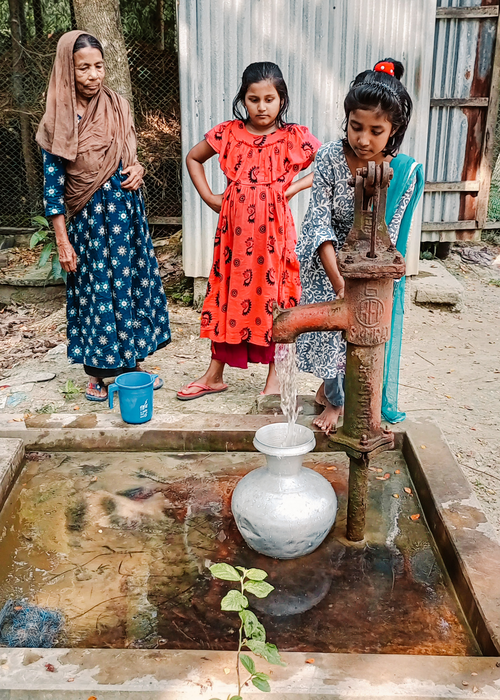In rural Bangladesh, areas with high levels of arsenic contamination in drinking water, compared to areas with less contamination, have a higher prevalence of antibiotic-resistant Escherichia coli in both water and child stool samples, according to a new study publishing December 8, 2022 in PLOS Pathogens by Mohammad Aminul Islam of Washington State University, and colleagues.

Credit: Golam Mostafa Quadrey (CC-BY 4.0, https://creativecommons.org/licenses/by/4.0/)
In rural Bangladesh, areas with high levels of arsenic contamination in drinking water, compared to areas with less contamination, have a higher prevalence of antibiotic-resistant Escherichia coli in both water and child stool samples, according to a new study publishing December 8, 2022 in PLOS Pathogens by Mohammad Aminul Islam of Washington State University, and colleagues.
Antibiotic resistance is one of the leading causes of death and hospitalization worldwide. While the major drivers of antibiotic resistance are the overuse and misuse of antibiotics, natural elements such as heavy metals can also promote antibiotic resistance.
In the new study, researchers collected water and stool samples from both mothers and young children of 100 families in two rural subdistricts in Bangladesh. Families in the Hajiganj subdistrict use drinking water from shallow tube wells, which have a high concentration of arsenic, while Matlab families collect their drinking water from arsenic-free deep tube wells.
The median arsenic concentration in the 50 water samples from Hajiganj was 481 μg/L while the median arsenic concentration in the 50 water samples from Matlab was 0 μg/L. Overall, 84% of all water and stool samples across both sites were found to be positive for E. coli. Prevalence of antibiotic resistant E. coli was significantly higher in water in Hajiganj (48%) compared to water in Matlab (22%, p<0.05) and among children in Hajiganj (94%) compared to children in Matlab (76%, p<0.05), but not among mothers. Moreover, a higher proportion of E. coli from Hajiganj were resistant to multiple antibiotics, including penicillin, cephalosporin, and chloramphenicol.
“The positive association detected between arsenic exposure and antibiotic resistance carriage among children in arsenic-affected areas in Bangladesh is an important public health concern that warrants redoubling efforts to reduce arsenic exposure,” the authors say.
Dr. Islam adds, “Heavy metals such as arsenic are more stable than antibiotics in the environment, and they continue to exert selective pressure on bacteria over a more extended period driving the evolution and expansion of antimicrobial resistance in the community. The extent to which this phenomenon drives the observed higher rates of antimicrobial resistance, as opposed to other confounders, would benefit from further study; nevertheless, it is critical to contain this environmental driver of antimicrobial resistance along with responsible antimicrobial usage in medicine and agriculture.”
############
In your coverage, please use this URL to provide access to the freely available article in PLOS Pathogens: http://journals.plos.org/plospathogens/article?id=10.1371/journal.ppat.1010952
Citation: Amin MB, Talukdar PK, Asaduzzaman M, Roy S, Flatgard BM, Islam MR, et al. (2022) Effects of chronic exposure to arsenic on the fecal carriage of antibiotic-resistant Escherichia coli among people in rural Bangladesh. PLoS Pathog 18(12): e1010952. https://doi.org/10.1371/journal.ppat.1010952
Author Countries: Bangladesh, Norway, Switzerland, USA
Funding: The study was supported by a REACH catalyst grant, United Kingdom to icddr,b (icddr,b Grant No. GR-01507) in which MAI was the Project Lead, and Paul G. Allen School for Global Health, Washington State University (Startup grant: PG00005723 to MAI). The funders had no role in study design, data collection and analysis, decision to publish, or preparation of the manuscript.
Journal
PLoS Pathogens
DOI
10.1371/journal.ppat.1010952
Method of Research
Observational study
Subject of Research
People
Article Title
Effects of chronic exposure to arsenic on the fecal carriage of antibiotic-resistant Escherichia coli among people in rural Bangladesh
Article Publication Date
8-Dec-2022
COI Statement
Competing Interests: The authors have declared that no competing interests exist.




